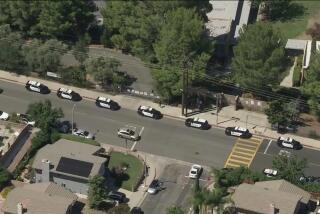Class Notes / NEWS FROM YOUR NEIGHBORHOOD SCHOOLS : Students End Fights With Heart
- Share via
School administrators, parents and students seeking a way to prevent school violence can take HEART.
Human Efforts Aimed at Relating Together is a student mediation program that brings together young people from different ethnic and religious backgrounds to help fellow students resolve conflict through dialogue instead of violence.
The citywide program, which involves students, teachers, school counselors and administrators, is in place at a number of Valley campuses, including Birmingham High School in Van Nuys, Chatsworth High School, and Cleveland High School in Reseda. Maclay and Mulholland middle schools, in Pacoima and Van Nuys respectively, as well as a handful of elementary schools, also participate.
“HEART provides an opportunity for kids to learn how to get along and to learn about other cultural and ethnic groups,” said Birmingham Principal Gerald Kleinman. “It helps reduce violence on campus and teaches understanding among groups who don’t always get along.”
HEART mediators recently intervened after a heated conflict at Birmingham High, in which verbal insults between students of different ethnic backgrounds escalated into a group fistfight.
The mediators met with the students individually and in groups, focusing on what issues caused the fight and helping them find solutions.
“I’m so impressed with how these mediators work,” said Pete Salazar, Birmingham’s dean of students. “Last year we had many fights breaking out, and I had to kick students out of school. I’ve been trained by HEART now, and I have a good feeling that we now have a handle on these problems on campus.”
HEART was created in 1992 by Joel T. Juntilla, a youth relations assistant for the Los Angeles Unified School District. The goal of the program, he said, is to get young people to assume responsibility for providing a safe school environment.
Representatives from each ethnic, racial and religious group at a school are chosen to participate in a training program in which they learn how to implement Juntilla’s “Four Ds to Conflict Mediation and Resolution.” They are: defuse the situation; create a dialogue between parties in conflict; decide on a solution, which is formalized in a written contract; and do what you promise.
The participants meet once a week to discuss problems that have erupted during school hours and to stop rumors that may have sparked them. Students also are on call to intervene and mediate when conflicts arise.
“Students often don’t want to bring out the whole truth in front of adults,” said Megan Wallace, 16, a Birmingham HEART participant. “I’ve been in trouble before and know some of the solutions to their problems. We know what to say and what not to say.”
*
Birmingham English teacher Andrea Barer has also instituted a classroom program called Positive Education and Action to Create Excellence, or PEACE. She teaches character-building skills, such as accepting consequences for one’s actions, by analyzing Richard Wright’s “Black Boy” and Daniel Keyes’ “Flowers for Algernon,” among other novels.”
Both programs aim to give students the tools to relate to others with tolerance rather than bigotry.
“When we give young people the power to solve problems, and not become a part of them, they can’t fail,” Juntilla said.
More to Read
Sign up for Essential California
The most important California stories and recommendations in your inbox every morning.
You may occasionally receive promotional content from the Los Angeles Times.










